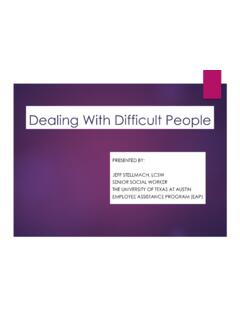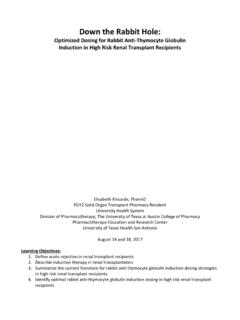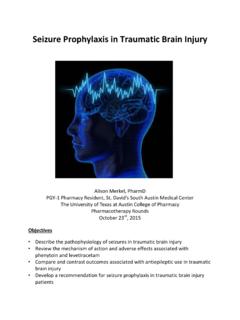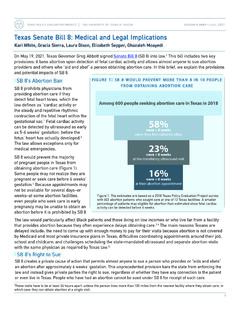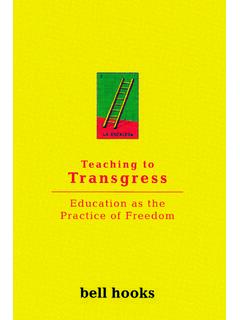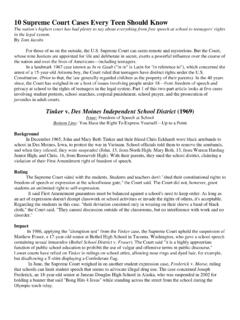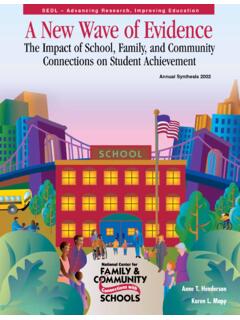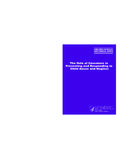Transcription of Teaching To Transgress - University of Texas at Austin
1 T e a c h i n g to Transgress This page intentionally left blank T e a c h i n g to Transgress Education as the Practice of Freedom bell hooks Routledge New York London Published in 1994 by Published in G reat Britain by Routledge Routledge Taylor & Francis G roup Taylor & Francis G roup 711 T hird Avenue 2 Park Square New York, NY 10017 Milton Park, A bingdon O xon OX14 4RN. C opyright 1994 G loria W atkins All rights reserved. No p a rt of this book may be re p rin te d or rep ro d u ce d or utilized in any form or by any electronic, m echanical o r o th e r m eans, now known or h ereafter invented, including photocopying and reco rd in g or in any inform ation storage or retrieval system, w ithout perm ission in writing from the publishers. Library o f Congress Cataloging-in-Publication Data hooks, bell. T eaching to Transgress : education as the practice o f freedom /. bell hooks p. cm. Includes index ISBN 0-415-90807-8 ISBN 0-415-90808-6 (pbk.)
2 1. Critical pedagogy. 2. Critical thinking Study and Teaching . 3. Fem inism and education. 4. T eaching. I. Title. 1994. '5 dc20 94-26248. CIP. to all my students, especially to LaRon who dances with angels in gratitude for all the times we start over begin again . renew our joy in learning.. to begin always anew, to make, to reconstruct, and to n o t spoil, to refuse to bureaucratize the m ind, to understand and to live life as a process live to becom e .. Paulo Freire This page intentionally left blank C ontents In tro d u c tio n I. Teaching to Transgress 1 E n g a g e d P ed ag o g y 13. 2 A R ev o lu tio n o f V alues 23. The Promise of Multicultural Change 3 E m b ra c in g C h a n g e 35. Teaching in a Multicultural World 4 P au lo F re ire 45. 5 T h e o ry as L ib e ra to ry P ractice 59. 6 E ssentialism a n d E x p e rie n c e 77. 7 H old in g My Sister's H a n d 93. Fem inist Solidarity 8 Fem inist T h in k in g 111.
3 In the Classroom Right Now 9 Fem inist Scholarship 119. Black Scholars 10 B uilding a T eaching C om m unity 129. A Dialogue 11 L anguage 167. Teaching New Worlds /N ew Words C o n fronting Class 12 in the Classroom 177. Eros, Eroticism , 13 an d th e Pedagogical Process 191. 14 Ecstasy 201. T eaching and Learning W ithout Limits In d ex 209. Introd u ction Teaching to Transgress In the weeks before the English D epartm ent at O berlin Col . lege was about to decide w hether o r n o t I would be granted tenure, I was h au n ted by dream s o f ru n n in g away of disap . pearing yes, even of dying. These dream s were n o t a response to fear that I would n o t be granted tenure. They were a response to the reality that I would be granted tenure. I was afraid that I would be trapped in the academy forever. Instead o f feeling elated w hen I received tenure, I fell into a deep, life-threatening depression. Since everyone around me believed that I should be relieved, thrilled, proud, I felt guilty.
4 About my real feelings and could n o t share them with any . one. The lecture circuit took me to sunny California and the New Age world of my sister's house in Laguna Beach where I. was able to chill out for a m onth. W hen I shared my feelings with my sister (she's a therapist), she reassured me that they were entirely appropriate because, she said, You never wanted 2 Teaching to Transgress to be a teacher . Since we were little, all you ever wanted to do was w rite. She was right. It was always assumed by everyone else that I would becom e a teacher . In the apartheid South, black girls from working-class backgrounds had three career choices. We could marry. We could work as maids. We could becom e school teachers. And since, according to the sexist thinking of the time, m en did n o t really desire sm art women, it was assumed that signs of intelligence sealed o n e 's fate. From grade school on, I was destined to becom e a teacher .
5 But the dream of becom ing a writer was always present with . in me. From childhood, I believed that I would teach and write. Writing would be the serious work, Teaching would be the not-so-serious-I-need-to-make-a-living jo b . Writing, I believed then, was all about private longing and personal glory, but Teaching was about service, giving back to o n e 's community. For black folks Teaching educating was fundam entally polit . ical because it was rooted in antiracist struggle. Indeed, my all . black grade schools became the location where I experienced learning as revolution. Almost all our teachers at Booker T. W ashington were black women. They were com m itted to nu rtu rin g intellect so that we could becom e scholars, thinkers, and cultural workers black folks who used our m inds. We learned early that our devotion to learning, to a life o f the m ind, was a counter-hegem onic act, a fundam ental way to resist every strategy of white racist coloni.
6 Zation. T hough they did n o t define or articulate these practices in theoretical terms, my teachers were enacting a revolutionary pedagogy of resistance that was profoundly anticolonial. W ithin these segregated schools, black children who were deem ed exceptional, gifted, were given special care. Teachers worked with and for us to ensure that we would fulfill our intel . lectual destiny and by so doing uplift the race. My teachers were on a mission. Introduction 3. To fulfill that mission, my teachers m ade sure they knew . us. They knew our parents , our econom ic status, where we wor . shipped, what our hom es were like, and how we were treated in the family. I went to school at a historical m om ent where I was being taught by the same teachers who had taught my m other, her sisters, and brothers. My effort and ability to learn was always contextualized within the framework of generational family experience. Certain behaviors, gestures, habits o f being were traced back.
7 A ttending school then was sheer joy. I loved being a stu . dent. I loved learning. School was the place of ecstasy plea . sure and danger. To be changed by ideas was pure pleasure. But to learn ideas that ran counter to values and beliefs learned at hom e was to place oneself at risk, to en ter the dan . ger zone. H om e was the place where I was forced to conform to som eone else's image of who and what I should be. School was the place where I could forget that self and, through ideas, reinvent myself. School changed utterly with racial integration. Gone was the messianic zeal to transform our minds and beings that had characterized teachers and their pedagogical practices in our all-black schools. Knowledge was suddenly about inform ation only. It had no relation to how one lived, behaved. It was no longer connected to antiracist struggle. Bussed to white schools, we soon learned that obedience, and n o t a zealous will to learn, was what was expected of us.
8 Too m uch eagerness to learn could easily be seen as a threat to white authority. W hen we entered racist, desegregated, white schools we left a world where teachers believed that to educate black children rightly would require a political com m itm ent. Now, we were mainly taught by white teachers whose lessons reinforced racist stereotypes. For black children, education was no longer about the practice of freedom . Realizing this, I lost my love of school. 4 Teaching to Transgress The classroom was no longer a place o f pleasure or ecstasy. School was still a political place, since we were always having to counter white racist assumptions that we were genetically infe . rior, never as capable as white peers, even unable to learn. Yet, the politics were no longer counter-hegem onic. We were always and only responding and reacting to white folks. T hat shift from beloved, all-black schools to white schools where black students were always seen as interlopers, as n ot really belonging, taught me the difference between education as the practice of freedom and education that merely strives to reinforce dom ination.
9 The rare white teacher who dared to resist, who would n o t allow racist biases to determ ine how we were taught, sustained the belief that learning at its most pow . erful could indeed liberate. A few black teachers had jo in ed us in the desegregation process. And, although it was m ore diffi . cult, they continued to n u rtu re black students even as their efforts were constrained by the suspicion they were favoring their own race. Despite intensely negative experiences, I graduated from school still believing th at education was enabling, that it en . hanced our capacity to be free. W hen I began undergraduate work at Stanford University , I was enthralled with the process of becom ing an insurgent black intellectual. It surprised and shocked me to sit in classes where professors were n o t excited about Teaching , where they did n o t seem to have a clue that education was about the practice of freedom . During college, the prim ary lesson was reinforced: we were to learn obedience to authority.
10 In graduate school the classroom becam e a place I hated, yet a place where I struggled to claim and m aintain the right to be an in d ep en d en t thinker. The University and the classroom began to feel m ore like a prison, a place of punishm ent and confinem ent rath er than a place of promise and possibility. I. Introduction 5. wrote my first book during those undergraduate years, even though it was n o t published until years later. I was writing; b u t m ore im portantly I was preparing to becom e a teacher . Accepting the Teaching profession as my destiny, I was tor . m ented by the classroom reality I had known both as an u n d er . graduate and a graduate student. The vast majority o f our professors lacked basic com m unication skills, they were n o t self-actualized, and they often used the classroom to enact ritu . als of control that were about dom ination and the unjust exer . cise of power. In these settings I learned a lot about the kind of teacher I did n o t want to become.
